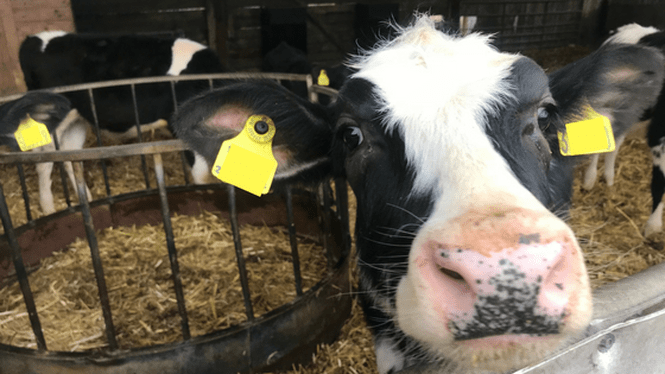Apheya Animal Nutrition are pleased to publish the findings from our first product trial of Herbaboost – a single dose drench of oregano oil and supporting nutrients to improve the response to challenges facing new-born calves.
Our first product trial has taken place on a dairy farm in Cornwall, milking approximately 260 cows and block calve in both the spring and autumn. Over the previous few years the herd manager has been faced with tackling both coccidiosis and cryptosporidium and as such is currently adding a plant-based product to milk powder, to help reduce the incidents of both diseases.
Initially, 100 calves (entire calving block) were identified for the trial, however, after a period of heavy snowfall and bad weather in the area presented a range of issues on farm, a decision was made to cut the trail at 24 (current calf numbers at the time) to enable the farm staff to deal with all the issues the bad weather brought.
Calves were given each product based on ear tag number with those that had even numbers being given a single 40ml syringe of Herbaboost at birth, and those with an odd number given five 10ml doses of a plant-based powder over a 5 day period from day 4 onwards. This was administered by mixing into milk and bottle feeding each calf individually.
Results below are based on 23 calves as one of the group became ill and had to be put down. During the trial, the following investigations have taken place;
Faecal Egg Counts
Analysis was carried out by approved laboratories to determine whether there was evidence of either cryptosporidium, or coccidiosis and the number of oocyte present in dung.
Rear End/Dung Scoring
Both cryptosporidium and coccidiosis can be contracted through dung in calf pens; cleanliness of calves is of great importance, and a simple scoring chart was developed to measure the cleanliness of calves’ rear ends.
Daily Liveweight Gain (DLWG)
Due to the gut conditioning properties of oregano oil, Herbaboost can improve feedconversion rations by reducing the challenge posed by oocytes, and therefore potentially reducing weaning time and costs.

In order to determine the significance of using Herbaboost over an alternative herbal product in identifying levels of cryptosporidium in the group of calves, a paired t-test was carried out to identify if there was in fact a significant difference in using Herbaboost in reducing cryptosporidium in calves.
“A paired-samples t-test was conducted to compare levels of cryptosporidium in the calf group from those calves that had been drenched with Herbaboost (M=1.60, SD=0.55) and those that have had the alternative herbal based product (M=1.80, SD=0.45); t(4)=0.5345, p = 0.6213. These results suggest that this is no significant difference in using Herbaboost compared to an alternative product on farm in reducing the effects of cryptosporidium.”

In order to determine the significance of using Herbaboost over an alternative herbal product in identifying levels of coccidiosis in the group of calves, a paired t-test was carried out to identify if there was in fact a significant difference in using Herbaboost in reducing coccidiosis in calves.
“A paired-samples t-test was conducted to compare levels of coccidiosis in the calf group from those calves that had been drenched with Herbaboost (M=1.17, SD=0.39) and those that have had the alternative herbal based product (M=1.55, SD=0.52); t(10)=2.8868, p = 0.0162. These results suggest that there is a significant difference in using Herbaboost to reduce the effects of coccidiosis against the alternative product that is currently in use on farm.”

In order to ascertain rear end cleanliness, a scoring chart was developed to consistently score the rear end of the calves. As both Coccidiosis and Cryptosporidium can be passed from dung, ensuring clean conditions for calves is of utmost importance. Results from the trial show that those calves that were drenched with Herbaboost were cleaner in the rear end than those calves that were given the alternative product.

Results show that those calves that were given Herbaboost had an increased liveweight gain from weeks 1-4 and weeks 4-8 and therefore an increased liveweight gain over the entire weaning period. Over the 8 week weaning period this difference in average liveweight gain equates to a difference in weaned weights of approximately 5kg.
Conclusion
Results show that those calves that were given Herbaboost at day one as a method of combating coccidiosis and cryptosporidium were subject to an increased liveweight gain and had cleaner rear ends. There was a significant difference in incidents of coccidiosis with those that had been given Herbaboost having less incidents and no significant difference in incidents of cryptosporidium. This shows that Herbaboost is just as effective at dealing with cryptosporidium as the alternative product that was used in the trial.





